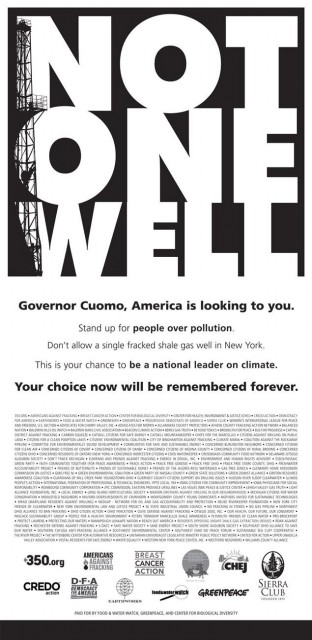…is divestment a more feasible reality?
As New York draws closer to the development of a hydrofracking state, groups from all over have banded together to stand up against the dawning reality.
New York Governor Andrew Cuomo, who has been known to support drilling the Marcellus Shale depository, believes the project will not only create thousands of jobs for New York residents, but will also help the United States reduce its dependency on foreign oil. To combat such a theoretically beneficial economic move, the opposition will have to be strong.
And it is.
Just a few weeks ago, 135 groups came together to organize, fund, and release an ad campaign to pressure Gov. Cuomo to stop fracking in New York.
Recognizing Cuomo’s presidential ambitions, the ad was strategically released in an Iowa newspaper–Iowa will be the home of the first presidential caucus for the next election.
The ad demands that not one well be drilled in the state of New York, urging that this is his “chance to be a national leader on climate.” For Cuomo, ignoring the demands may cost him a presidential election in 2016.
In early February, Artists Against Fracking member Yoko Ono released an ad attacking Cuomo’s refusal to ban hydrofracking in New York. Aired on New York televisions for a whole weekend, and available on Youtube, the ad criticizes highlights the severe contamination to the water supply in hydrofracking areas, and criticizes the governor’s refusal to meet with Ono. You may recognize a number of clips in the ad (below) taken from the critically acclaimed documentary, Gasland.
[youtube http://www.youtube.com/watch?v=eph0kUgHUNg?feature=player_embedded&w=640&h=360]
A recent stroke of luck has granted anti-fracking activists an additional chunk of time to better organize and grow in strength and numbers. The Department of Environmental Conservatory (DEC) and the Department of Health (DOH) have both delayed green-lighting the development of New York fracking facilities, as more time is needed for both departments to complete their reviews and assessments of the projected drilling project.
In a letter to DEC Commissioner Joseph Martens, DOH Commissioner Dr. Nirav R. Shaw stated:
“…public health is the paramount question in making the [high-volume hydraulic fracturing] HVHF decision. And as Health Commissioner, protecting the public health is my primary job….. From the inception of this process, the Governor’s instruction has been to let the science determine the outcome. As a physician and scientist, I could not agree more. Whatever the ultimate decision on HVHF going ahead, New Yorkers can be assured that it will be pursuant to a rigorous review that takes the time to examine the relevant health issues.”
With additional time, activists have taken the opportunity to raise awareness and heighten advocacy in the Empire State. On February 6, founder and leader of global grassroots movement 350.org Bill McKibben led a presentation and panel discussion at the Cooper Union in Manhattan discussing the importance of banning hydrofracking, and the fight to divest our resources in fossil fuel procurement and consumption.
[youtube http://www.youtube.com/watch?v=_u1RgkrTeLw?feature=player_detailpage&w=640&h=360]
McKibben showcased the accomplishments and global exposure of 350.org, which has managed to influence three universities and colleges (Hampshire, Unity, and Sterling) to divest their holdings in fossil fuel company stock, as well as two major municipalities, Seattle and San Francisco, to begin planning on how to fully and successfully divest their cities.
Despite these major accomplishments, McKibben admitted the overpowering strength of the oil companies, stating ” …Washington is just about power… on the one hand, Exxon has piled huge amounts of money so the scale tips in their direction. We have to pile enough bodies and passion and energy on the other side of the scale.” Without matching the political voice and strength of their oil tycoon counterparts, anti-frackers may be faced with a losing battle for the fight to stop hydrofracking.
But McKibben and the rest of the anti-frackers allegedly have no plans of losing.
“Forward On Climate”, an anti-fracking rally organized by 350.org and the Sierra Club, among many other organizations and funders, marched down the National Mall to the White House in Washington D.C. on February 17 to place pressure on President Barack Obama to ban construction of the Keystone Pipeline. The pipeline, if passed, would cut through the entire Midwest, transporting hydrofracked fossil-fuels from the Athabasca oil sands in Alberta, Canada, risking the water quality and environmental integrity of the projected pipeline area.
The impacts of the rally may have had an effect on Governor Cuomo’s decision to continue plans for developing a hydrofracturing system in New York. President Obama’s decision on the KeystoneXL will likely further influence his choices.
In the most recent State of the Union address, the President took a strong stance on energy, stating the need for Americans “to believe in the overwhelming judgment of science and [to] act before it’s too late.” He urged Congress to propose a policy allowing a percentage of oil and gas revenue to fund an Energy Security Trust. The funds from such a trust would then be reserved for new research and technology in cleaner, renewable energy production.
[youtube http://www.youtube.com/watch?v=29eakXqIaWM?feature=player_detailpage&w=640&h=360]
Obama did express the importance of more affordable, less foreign-dependent oil and natural gas (which may be a subtle hint that he supports a Keystone Pipeline and a New York drilling project), yet he simultaneously stressed the need to “shift our cars and trucks off oil for good.”
Nonetheless, the coming weeks will be a pivotal time for the future of New York and the rest of the nation. Eyes are on our elected officials and politicians to see what direction they will take us in the future of American energy production. Voices will certainly be raised in these same weeks with great volume and intensity, and the same politicians and officials will have to hear them. In such monumental times, make sure your voice does not go unheard.
